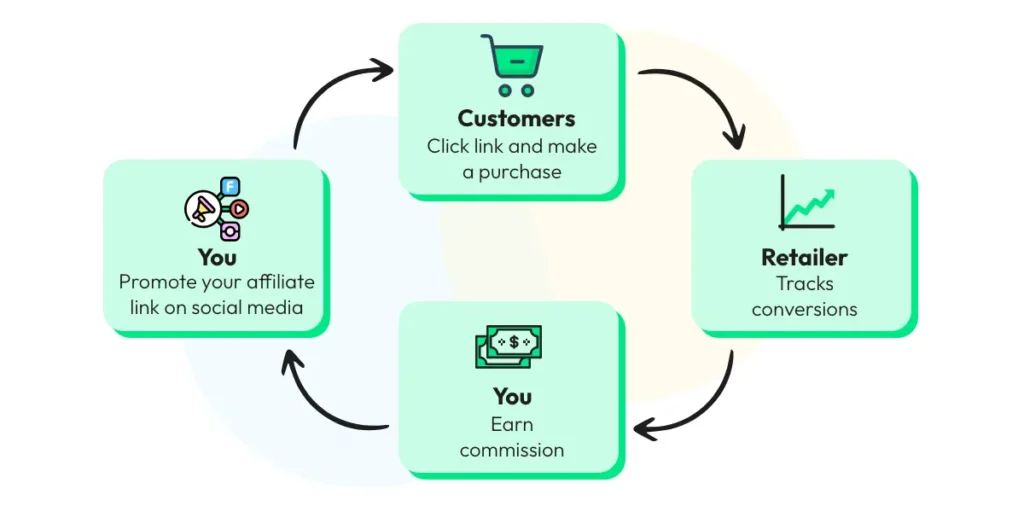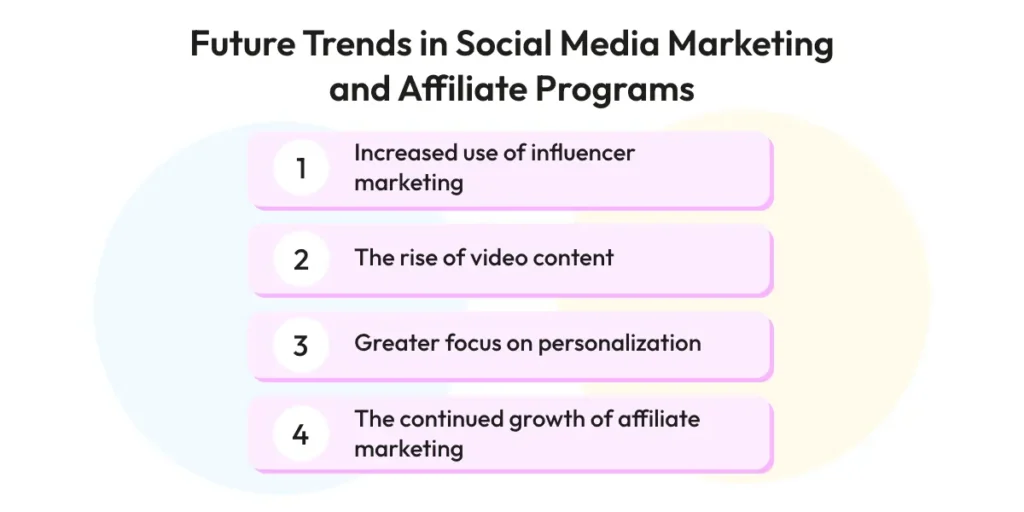Certainly! Here’s an overview of how social media can be effectively utilized in affiliate marketing in 2024:
- Influencer Partnerships: Leverage influencers on various social media platforms to promote your affiliate products or services. Choose influencers whose audience aligns with your target market for maximum impact.
- Content Marketing: Create engaging and valuable content related to your affiliate products or services. Share this content on your social media channels to attract and educate your audience, driving them towards making a purchase through your affiliate links.
- Audience Engagement: Actively engage with your social media audience by responding to comments, messages, and mentions. Building a strong relationship with your audience fosters trust and encourages them to consider your affiliate recommendations.
- Conversion Optimization: Implement conversion optimization strategies on your social media channels to increase the likelihood of users clicking on your affiliate links and making a purchase. This may include using compelling calls-to-action, creating visually appealing posts, and testing different messaging and offers.
- Social Media Platforms: Utilize various social media platforms such as Facebook, Instagram, Twitter, LinkedIn, TikTok, and YouTube to reach different segments of your target audience. Tailor your approach and content according to the platform’s unique features and audience preferences.
- Affiliate Programs: Join reputable affiliate programs that offer competitive commissions and provide marketing support. Choose programs that align with your niche and offer products or services that resonate with your audience.
- Data Analytics: Utilize social media analytics tools to track the performance of your affiliate marketing efforts. Monitor key metrics such as click-through rates, conversion rates, and revenue generated to identify what strategies are working well and where improvements can be made.
- Compliance and Disclosure: Ensure compliance with relevant regulations and guidelines, such as disclosing your affiliate relationships transparently to your audience. This helps build trust with your audience and maintains your credibility as a marketer.
By strategically leveraging social media in your affiliate marketing efforts, you can effectively reach and engage your target audience, drive conversions, and ultimately increase your affiliate revenue in 2024.

Benefits for Brands and Content Creators
For brands:
- Reach a wider audience: Social media affiliate marketing allows brands to tap into large user bases and engage consumers on various social media platforms.
- Cost-effective advertising: Instead of paying for traditional advertising, brands only pay for the results generated by the affiliate marketing program, such as sales or leads.
- Increase sales and conversion rates: By partnering with content creators who have built trust with their audience, brands can leverage their influence to drive more sales and enhance their conversion rates.
- Access to diverse content: Content creators bring their unique perspectives and creativity to promote brands, resulting in various content styles and formats.
For content creators:
- Earn money from content: Content creators can monetize their social media presence and content by participating in affiliate marketing programs, regardless of their follower count.
- Flexibility and independence: Affiliate marketing allows content creators to choose the brands and products they want to promote, giving them control over their content and allowing them to align with their personal brand.
- Passive income potential: Once the content is created and the affiliate links are shared, content creators can earn passive income as long as their audience engages with the promotions.
- Opportunities for growth and collaboration: Successful participation in affiliate marketing programs can lead to collaborations with brands, sponsorships, and other opportunities for professional growth.

Choosing the Right Social Media Platform for Affiliate Marketing

As social media continues to dominate the digital landscape, more and more brands and content creators are turning to social media affiliate marketing to generate income and reach a wider audience. Social media affiliate marketing allows content creators to earn commissions by promoting brands and referring customers, while brands benefit from reaching a larger audience without paying for advertising upfront. However, with so many social media platforms available, it can be challenging to determine which one is the best fit for your affiliate marketing efforts. In this section, we will provide an overview of the popular social media platforms and discuss the factors to consider when choosing the right platform for your affiliate marketing strategy.
Overview of platforms
YouTube
YouTube is a powerhouse when it comes to affiliate marketing, particularly for content creators who focus on educational and entertaining content. With its vast user base and diverse content offerings, youtupe provides ample opportunities for creators to promote products and earn commissions.
twitter is known for its short, snappy content and is suitable for promoting consumer electronics products. Its real-time nature makes it an ideal platform for sharing affiliate links and engaging with followers.
TikTok
Tictok has quickly gained popularity, especially among younger audiences, and offers high reach and engagement. However, adding affiliate links on TikTok can be challenging due to certain restrictions and limitations on the platform.
With its large and active user base, Facebook is a popular platform for affiliate marketing, particularly in broad and general-interest niches. Content creators can leverage Facebook’s powerful targeting options to reach their desired audience and promote affiliate products effectively.
instagram is well-suited for lifestyle niches and has good organic reach. However, adding affiliate links on Instagram can be more challenging compared to other platforms, as the platform restricts clickable links in captions. Content creators often rely on features like Instagram Stories and the bio section to drive traffic to their affiliate products.
pinterest is a visual platform that works well for creative niches, such as fashion, home decor, and DIY. With its focus on visual content and easy integration of affiliate links, Pinterest offers a seamless experience for content creators looking to monetize their platforms.

Factors to consider in platform selection
When choosing the right social media platform for your affiliate marketing strategy, several factors should be taken into consideration:
- User base size and demographics: Consider the size and demographics of the platform’s user base to ensure that your target audience aligns with the platform’s user profile.
- Top-performing content types: Analyze the types of content that perform well on the platform and determine if they align with your content style and goals.
- Competition: Assess the level of competition within your niche on the platform. A highly saturated market may make it more challenging to stand out and gain traction.
- Organic reach and engagement: Evaluate the platform’s organic reach and engagement potential to ensure that your content will reach a significant number of users and generate meaningful engagement.
- Paid media options: Consider the availability and effectiveness of paid media options on the platform, as they can complement your organic efforts and help amplify your affiliate marketing campaigns.
- Suitability for affiliate marketing: Assess the platform’s compatibility with affiliate marketing strategies, such as the ease of adding affiliate links and the platform’s policies regarding promotional content.
By carefully considering these factors, you can choose the social media platform that best aligns with your niche, goals, content style, and budget, maximizing your chances of success in the world of social media affiliate marketing.
